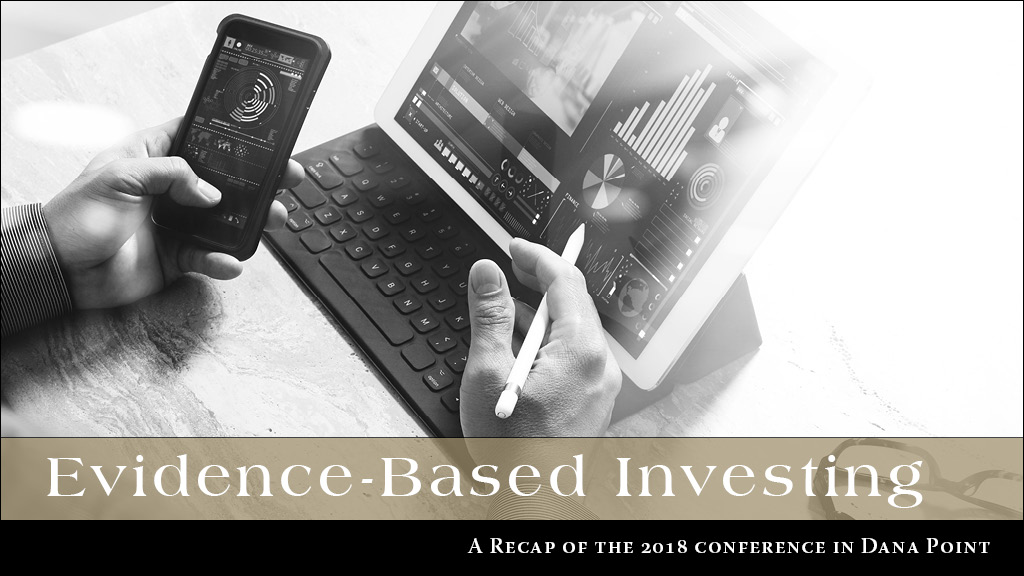Insights on Evidence-Based Investing

Earlier this year, John, Peter, and I attended the Evidence-Based Investing Conference in Dana Point, CA. This dynamic conference started just two years ago but already lines out the most impressive list of speakers of any investment conference anywhere.
Probably the best part is that it remains relatively undiscovered—the number of attendees was less than 200—making all of the speakers very accessible.
We heard from Joe Davis (Chief Global Economist at Vanguard), Ken Fisher (of TV fame), Annie Duke (former professional poker player), Ryan Holiday (author of The Daily Stoic), and a laundry list of book authors, blog publishers, podcast hosts, and industry leaders. We not only heard their formal presentations, but we also had the chance to speak with many of them one-on-one.
We’re extremely susceptible to rushing “into the weeds” and this was definitely an environment with some very tall weeds! Fortunately, the experts we talked to emphasized the importance of focusing on “big muscle movements”—the concepts that make a difference.
In my brief recap, I'm going to try to pick out a concept or two that each speaker highlighted in their talk.
Joe Davis – The first question that the interviewer asked Joe was “Why does Vanguard need an economist?” Joe replied that his job was to develop probability distributions for expected returns, not to provide certainty. It’s refreshing to hear an economist take this sort of stance in describing the value they provide. All too often, whether on TV or in publications, economists strive to accomplish the impossible task of predicting the future.
Ken Fisher – Ken Fisher is the founder of the country’s largest Registered Investment Advisor (RIA) and is a frequent financial commentator on TV. He is #200 on the Forbes 400 list and he definitely was not what any of us would call “humble.” However, I did find a few good takeaways from his talk.
First, Ken highlighted the importance of frequently trying and failing, because that is how you learn and improve. He added a caveat: failures need to be small and not lead to irreparable damage. But, he emphasized there is no substitute for “doing.”
Ken also had a great point around recruiting; he believes that resumes are a hiring manager’s worst enemy.
A resume shows you what someone “can do,” but he is much more interested in what someone “will do.”
The willingness to work hard,
Annie Duke – Annie authored an excellent book called “Thinking in Bets,” based on her experience as a professional poker player. The biggest takeaway from her talk is that we are all susceptible to what she calls “resulting.”
Resulting occurs when we judge the quality of our decisions based on the outcome, not necessarily on the process we used to make the decision.
She referenced the example of Pete Carroll’s infamous goal-line call to throw on 2nd and 1, rather than hand the ball off to Marshawn Lynch. She broke down the thought process that Coach Carroll used to make that call and concluded the decision was sound from a probabilistic perspective. However, most people relied on the outcome to evaluate the quality of his decision rather than give credit for the soundness of his thought process.
There is a huge parallel here with investing and planning: because the future is uncertain the best that we can do is stack the odds in our favor. One way Annie seeks feedback from others about her decision-making in poker is to withhold the result from the person she is sharing with, focusing solely on the way she played a hand. We are all subject to resulting and it drastically alters our ability to see the quality of the decision when we know the outcome.
Ryan Holiday – Ryan’s keynote presentation focused on incorporating Stoicism into our decision-making. A saying that all of us are fond of is “control what you can control,” which is Stoicism in a nutshell. A tip he gave to all of us was to visualize all of the bad things that could happen and plan for them. This helps to reduce the downside risk associated with any decision. He also observed that it is not things that upset us, but our judgments about those things.
By creating space between the events that transpire around us and how we react, we can improve the way we interact with the world.
On the surface, it may be hard to understand what a professional poker player or an author of a book on stoicism can teach us about investing. But it all comes down to having an evidence-based process that helps us focus on the things that we can control and stop worrying about the things that we cannot control. We have an investment philosophy that frees us up from the futile task of predicting and reacting to short-term market fluctuations. This affords us the opportunity to focus on what really matters: helping clients reach their financial goals.
I could write for a few more pages on some of the more


